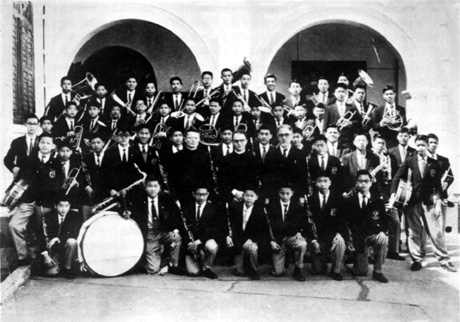 Salesian Institute Band
Salesian Institute Band
The text below is a revised version of a speech given during 'Army Week' at the Leal Senado (City Council), on the 21st of July, 1982.
A speech on cultural issues is a traditional feature in the celebrations of 'Army Day' in Macau.
I am honoured to have been chosen to give this speech mainly because this is the first time a lady is going to do it.
It is also the first time I address the public of the Macau at the City Council.
In addition to the responsibility, I feel that I am being attentively watched by the past. In this room we are surrounded by paintings of the past which mean much more than mere paintings. They represent the history of those who paved the way for something that they are expecting to happen right now.
Knowing the history of Macau is a point of honour. We need to and must know it otherwise those who trusted and had confidence in us are likely to be deceived by our ignorance.
In fact, only ignorance of the past will explain the carelessness and irresponsibility shown when dealing with public matters. If the gigantic steps taken by the Portuguese since they first settled in Macau until our wealthy and prosperous days were known, respected and accepted by everybody, our behaviour while in Macau would have a dramatic turnabout. We brought a new language to this region and from here we left to spread the Christian Faith. With both language and faith we widened the boundaries within which mankind's potential currently lies.
The Portuguese universalism is well documented in Macau. Despite the proximity of the old Eastern Culture, the beach where we settled in China was no more than a port of shelter.
With the determination they had acquired during the Discoveries, our people were pioneers taming the difficult terrain they encountered. They had to accustom themselves to strange people and weather, give and take, tighten ties, give respect and make themselves respected.
Burning, rigorous Summers came and went and the Spring breeze met an ever growing town with more boats which called in at this port. Even though it was unintentional, the multi-racial society was shaping today's Macau, a miracle of tolerance between races.
The right balance was not always easy to achieve. Besides there is no growth without crises and when these are over they are like typhoons - they clear the sky.
The need to survive made people aware of each group's potential and this resulted in mutual understanding and help. Although Macau became prosperous very early it also endured war, hunger, plague, death and all this helped to unite and shape its people's soul.
In the short period I had to prepare this speech I did not have the opportunity to carry out a thorough investigation. I then decided to make a short analysis of the events which have occurred since the last quarter of the XIXth century. Personal limitations prevented me from approaching Culture from its various angles. I therefore selected Music and its link with the public. The military element performed that link by organizing and establishing the first regimental band in Macau.
Prior to speaking about the current areas of action we must have a look at the continual changes that the authorities (both police and military forces) experienced. According to the documents that I have checked, the official city garrison in 1810 was the Prince Regent Batallion. But this was not enough and Hindu soldiers from Goa and Bengal were hired as private guards. No military force is mentioned and only in 1841 a Royal Bill approved the first Police Regulations. However, 16 years later and unrelated to the above Regulations, a Police Corps was established by a renowned Macanese, Honorary Major Bernardino de Senna Fernandes, who owned, maintained and gave it accomodation.
Next came the 'Polícia do Bazar' (Bazaar Police) which was a civilian group supported by donations from the Chinese people. At last, the Police Corps was officially established in 1869.
No reference to a regimental band was found in the thorough search I carried out, but I managed to spot some clues that musicians were already being considered. The only information collected is that the new Police Corps Regulations whose wording was similar to that of the Macau Line Batallion, already included three buglers and one trumpeter.
I think that that was very little. Anyway it was impossible to expect more because batallions disappeared as fast as they were established and this did not give room for settlement.
This however did not prevent batallions from organizing their somewhat private small bands. According to a report from a newspaper called 'A Aurora Macaense' (Macanese Dawn), dated 16th of May, 1843, there were some small bands: "Dear Director, Last night at 9.00pm, almost every family in Macau enjoyed the cool breeze under the moonlight. Mr. Caetano António de Lemos together with his Officials and relatives of the Governor of Solor and Timor Islands, to whom he had offered dinner earlier, asked his batallion's band to play some music. After playing two or three pieces a sergeant from the Guard, armed with bayonet and sword, interrupted the session and told the musicians that the Governor wanted to know why they were playing after the curfew bell. While spectators gathered around; I left and thought about the reasons for that. Probably the Governor did not want to listen to any music or was there any recent order preventing music at night? I wanted to see the end of it. And I did. I saw something I had never seen before. I saw the poor musicians being escorted away by soldiers just because they were entertaining the public under the orders of their Commander.
The people of Macau saw the musicians being taken away by a patrol after which the Commander and his entourage left humiliated.
As I don't know whether the detention was fair I would appreciate very much if you could give me some help because I also like to play music under the moon and now I am afraid to.
I'm a long-time reader of your newspaper.
A Macau citizen.
The things one has to do for music!
It should be interesting to guess what kind of works those bands used to select for the garden concerts. The news of the opening of the 'Clube e Teatro D. Pedro V' (D. Pedro V Club and Theatre) gives us some clues as it was later used for music concerts, featuring French and Italian Opera Companies among others. Although being just mere social features, these influenced the people's taste for music. We can imagine summer nights at the S. Francisco Garden with leaves, crisp taffeta, smiles, fans, murmurs, romantic glances and smoke from Havanas all mixed with Verdi, Bellini or Donizetti' arias. The Seminary Student Martial Band had been established earlier. There were signs that Music wanted to expand. As there was no television at the time those outdoor music sessions brought together many people who became more demanding.
Meanwhile, the trend started favouring the Regimental Band. As soon as it was established, in 1871, the Infantry Batallion Musicians had a busy schedule. It was requested to play the reveille and the retreat, hymns and anthems at anniversaries, processions or any other public or private event.
The growing interest in music explained the existence of a music group, forcing it to rehearse a lot and perform on a regular basis.
The interest was so great that the Provincial Bulletin of 6th of July, 1872 published the First Programme of the Infantry Batallion Band. Although the programme did not mention the venue nor the conductor it was a sign of interest. The programme included two sessions with five pieces each, in other words ten different pieces. Not bad for a start!
It is commonly accepted that Music is a meeting point because the traditional concept of language is not needed. Therefore Portuguese musicians who came to Macau to play and conduct the Regimental Band were able to meet and understand those locals who were keen on music. Step by step the number of musicians in the band increased with Macanese, Chinese and Indians being recruited both in Macau and Hong Kong.
The efforts and dedication put into the band by all those involved lessened the initial lack of first class technique. The Sunday Mass at the Cathedral provided the opportunity for enjoying good music played by a Diocesan Seminary teacher, José Ponatti, on what was considered to be the best organ in Asia (made by the famous Verese's Bernaconi shop, near Milan). Throughout 1875 the Batallion Band programmes were published weekly. Sometimes the band included a quadrille or African fantasy amongst polkas and waltzes, not to mention delightful solos and vocal pieces. However, the Band's strong point was for many years the adaptation of opera and operetta arias mainly "Lammermoor's Lucy" and "The Regiment's Daughter".
But following that hardworking year the Infantry Batallion was disbanded and this was the first of many setbacks in the Music History of Macau.
Enthusiasm was dampened by insecurity. The musicians were transferred to the Police Corps. Pursuant to the Regulations dated February 1886, soldiers had to be Europeans, those born in Macau or India. Chinese could only be accepted temporarily in case of a vacancy. The music season was severely hurt. So far I have been following the information provided by the Provincial Bulletins.
Information regarding the period after, from 1887 to 1891, was found at the District Administration's Archives Centre. Although the amount of musicians was small the Band was quite busy.
There is an anonymous note concerning the price list for funeral services: short haul MOP25.00; long haul MOP30.00.
The Band was also engaged in processions since all churches requested the services of the Police Corps Band from the Government General Office to play the Guard of Honour.
Nevertheless the gay tunes which used to attract the children were no longer played.
But interest grew again and the outdoor sessions were reintroduced. It was so nice to stroll after the night tea, a chance to review the working day! In the light of the new reform, the Military Garrison demanded its old position which had been held by the Police Corps in the previous nine years.
At the time, a Regimental Band was composed of the following musicians:
1 Music Conductor
1 Assistant Music Conductor
3 Musicians- Level 1
4 Musicians- Level 2
8 Musicians- Level 3
8 Apprentice Musicians
3 Buglers
4 Drummers
8 Assistant Buglers
Theoretically there were 40 musicians!
The Band was given the necessary support and transformed the understanding into enthusiasm. It took its job seriously.
The Provincial Bulletin started to publish the Band's programme again and disclosed the venue. Sometimes there were three concerts in a week with twenty-four different pieces, not to mention the anthems.
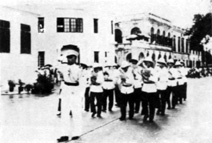 Public Safety Police Band (1956)
Public Safety Police Band (1956)
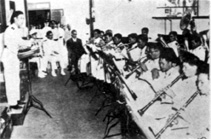 Public Safety Police Band
Public Safety Police Band
The quality of the Garrison Band which was established as Military Band in 1901 (as per the Official Gazette dated 14th of November) cannot be proved. However, we think that people liked it otherwise they would not put such efforts into it. Programmes started including the names of composers. During the XXth Century celebrations, at the first January concert, the Band played an original march called 'Hino do Leal Senado e ao Povo de Macau' (Hymn to the City Council and the People of Macau) which was composed by Melchor Vela. A Macanese presented his piece called 'Expedition to Macau in 1900'. At last, the cultural message brought by Music had touched the people and consequently they became more creative.
Even though in educational terms competition is currently being questioned, the truth is that throughout history mankind has profited from it. A good example of this was when the Band was transferred from the Police Corps to the Military Garrison. As the former could never accept this move they managed to set up their own music band which used to play together with the 'dissident' band. Under the name of Police Corps Orchestra it engaged in a lighter and softer repertoire which gave it access to receptions and balls at the Government Palace.
People started enjoying music more and more and waited anxiously for concerts.
The Town Band sponsored by the City Council, was established. Its conductor was Second Lieutenant Eusébio Francisco Placé, a methodical, demanding and enthusiastic Macanese who loved music. He even went to Lisbon to improve his knowledge of music. In addition to some pieces he composed I believe that the arrangements made for some instruments were also done by him. I got this information thanks to Brother Fantini of the Salesian Institute who showed me some manuscripts just a few days ago.
The Municipal Band had then five years to recover and work seriously. I think that Mr. Placé taught music theory, counterpoint and harmony. For his own guidance he made a manual copy of a book by Eugénio Ricardo Monteiro de Almeida which was used by Lisbon's National Conservatory. The Band was then serving as a music school as well. The conductor ordered pieces, adapted, rehearsed and performed them keeping the City Council and its population happy. In addition to traditional pieces of music, bands started playing some locally composed pieces like the Macanese dance called 'Pantomina' (Pantomime), the Indian quadrille 'Recordação do Mandovi' (Evocation of the Mandovi) or the gallope 'Mandarim' (Mandarin).
Bands also played great operatic and ballet works and the public started to like Mascagni, Puccini, Wagner, Offenbach, Delibes, Strauss and so forth.
When I first came to Macau I met an old man who could recall the concerts held on the Public Garden bandstand. At sunset I used to sit down with my grandfather on the balcony and thanks to those recollections we hummed the work of Verdi who happened to be his favourite composer. I have always wondered how he could do it so well because he was almost deaf. We can see that throughout the years people keep those pleasures with which they can find comfort when they get older. It also shows that these people enjoyed music like future generations will do if...
Let's go back to 1917. For unknown reasons by the end of the year Francisco Placé who had been replaced by conductor Mathias during his Summer leave, sailed away. The city Council then had the difficult task to find a new conductor. Mr. João Damasceno Fernandes, Musician - Level 1, was appointed Acting Conductor but he lacked the reputation of Mr. Placé who was known to be hardworking and persistent. At least that was what City Councillor Mr. Nolasco da Silva stated. This notwithstanding, after reading some newspapers published at the time I got the impression Mr. Fernandes performed his duties very well. In order to offer twenty-four pieces every week, his repertoire included tarantellas, boleros, waltzes, zarzuelas and people were still unhappy. I can admit that his concerts sounded as monotonous as a clock (this monotony was broken only when Sidónio Pais** was killed, thus requiring a change in the programme).
But the Leal Senado (City Council) was not happy at all. They wanted someone more active and more artistic. They thought of Mr. Constâncio José da Silva who proposed an ambitious programme which called for a lot of money. Besides, he could not be fully engaged in music because he had other activities such as being a lawyer, journalist, theatre director, Government Secretary. They were therefore unable to reach an agreement.
They then thought of a Filipino conductor, Mr. Isidoro Maria da Costa. An importer of music instruments in Hong Kong was also interested in the post. In his application letter he attached an American catalogue of musical instruments. This is rather interesting because with the eye of the modern businessman he saw that if he had been appointed conductor of the Municipal Band he could have ordered instruments from his own shop.
At last, on 16th of July, 1919, Mr. Aléssio Bénis, an Italian conductor who was working for a circus in Hong Kong was appointed for a two year term.
The Municipal Band had twenty-six musicians the majority being military. Its annual budget was MOP16,000 which was supported by the Government. Although Mr. Aléssio Bénis managed to reform the instrumental section, he faced serious internal problems. In fact the situation of those military musicians who were borrowed by the City Council caused problems in terms of salaries and leave. The City Council then ordered Aléssio to replace the soldiers with civilians. The conductor panicked as those were the best musicians in the Band and the public started complaining about the poor quality that the Band was showing. On its edition of 8th of May, 1920, 'O Liberal' (The Liberal) newspaper had the following to say: "Mr. Aléssio Bénis has been conductor of the Municipal Band for eight months but he has not been able to prepare it to play at parties. He has not even bothered to order music from America like foxtrots, onesteps or other dances. He prepares neither the band nor the small municipal orchestra announced earlier. The band's low standard is shown better when one engages half the band to play at dinners. Those who used to attend the garden sessions are running away thanks to such a lack of ability and skill."
That was too much. The City Council then resolved to close down the band. Besides, all costs of running it were included in the City Council's budget as 'Optional Expenses'. Sorry! Military musicians resumed their previous posts and the civilians were sacked. Mr. Aléssio Bénis was paid up to the end of his two-year term and at the Government Council of 28th of December, 1920 the Municipal Band was officially disbanded. Father Jacob Lau, member of the Government Council, was against that resolution but he was defeated.
However the people of Macau did not give up, they wanted to have their music sponsored by the government. They tried to establish a band, a Sextet and a choral group but the Ministry for Colonies did not approve (as per the 'O Combate' (The Combat) newspaper of 22nd of May, 1924).
This rather unstable period witnessed several bands and other similar music groups. Newspapers refer to the Salesian Band, São José Seminary Orchestra among others.
As regards the military musicians, they were still playing together in the New Macau Theatre orchestra (at 'Rua do Hospital'). Most probably they were also musicians in that band which used to play at Masses, Processions and Funerals between 1924 and 1927. As soon as the Municipal Band was disbanded, the Head of the Military Services, Lieutenant Eduardo Ferreira Viana, tried to set up another one. The 'A Verdade' (The Truth) newspaper dated 14th of August, 1927 quoted the 'A Pátria' (The Nation) newspaper of 12th of August: "If Macau were a small arts centre which it could and should be, the current captivity we are experiencing would be more tolerable. There is not even a municipal or government band to bring joy to these monotonous days, at least every Sunday and Thursday." However this joint effort was successful as was stated in the 'A Verdade' newspaper in a concert on the Avenida Vasco da Gama: "The Police Band has improved." It played so it meant there was a band. And the same article went on: "It would be a pity if the Band were disbanded. Everybody knows that Macau's people love good music and we do not see how the Band can ever be extinguished after so many efforts put into it for the last four months. Even remote villages in Portugal enjoy the privilege of having a band. It is hard to believe. What does the central government think about the Macau people?"
The Macau Police Band affair went on. It had been set up by the Racing Club, conducted by João Franco, following a Government decisinon. However the Colonies Ministry did not approved it (Decision no.5: 113, dated December, 1927). Despite this the Band kept performing but changed its name. Under the name of the Macau Band it used to play for the Governor and later Constâncio José da Silva became its conductor.
The renowned conductor was then invited to join another band. What band? The Municipal Band which was re-established pursuant to Official Gazettes nos. 24 and 25 of 1928. Previous musicians were re-admitted and the programme presented by Constâncio Silva, most probably the one presented earlier, was finally approved. Constâncio Silva was retired at the time and therefore he accepted the job. At the same time, an old competitor of his reappeared. It was Mr. Costa from Hong Kong, the musician and musical instrument agent. However, as stated by the 'A Verdade' newspaper, Isidoro da Costa was only able to delay the final appointment of Constâncio Silva.
The previous tradition of two weekly concerts was back either at S. Francisco Garden (with a new bandstand) or 'Avenida Vasco da Gama' for which better lighting and seats were ordered. In the meantime new music instruments arrived and everything went very well till late 1928.
1929 was a real Portuguese party. As the Band's level of performance was good, everyone liked it and the gardens where it used to play were all crowded. Enthusiasm was so great that after a concert a spectator climbed the bandstand and congratulated Constâncio da Silva. The spectator later revealed that he was the director and promoter of music programmes at a San Francisco (USA) radio station!
Pieces of music played became so popular that people got the habit of requesting songs. As mentioned earlier, concerts were held throughout the year and people were going to concerts just to enjoy the music. The music played was no longer taken as background music for their evening walks.
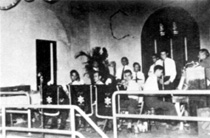
Public Safety Police Group (around 1957)
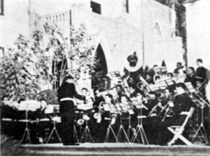
PSP Band (around 1958)
It was a rather sophisticated time but the future was not foreseen. Its weakness could be seen in the language used: there was the 'Soirée Masquée' at Carnival, 'Mademoiselles', 'Habitues', 'Jazz', phonograph, Belkiss rouge, kissproof make-up, talks regarding the stock market, trips on the luxurious N.Y.K. Line (Nippon Yusson Kaisha) liners.
Although in the thirties and forties music bands did not disappear completely, little was said about them. It was a time of war, and music became more restricted. Its popular dimension was lost. In 1950, after a series of articles published in the 'O Clarim' (The Bugle) and 'Notícias de Macau' (Macau News), Captain Manuel Pimentel Bastos, Lieutenant Hernâni Anjos, Second Lieutenant Marques Pinto and others founded the Macau Cultural Centre. This Centre used the 'Mosaico' (Mosaic) magazine to publish cultural articles, and broadcast on radio a great deal of music programmes prepared by Luís Gonzaga Gomes. It went on for seven years and I wish I could tell you why it closed. Another point to ponder over would be the reason why we no longer have civilian and military people working together in cultural events.
The Band resumed on 1st of April,1951 but this time under the Police Department. It was composed of young men of 17 to 20 years of age who had just finished school at the 'Colégio D. Bosco' and the 'Salesian Institute'. The conductor was an Italian called Testa. A 1st Lieutenant came after him but did not do anything special. In 1958 something grand happened; thanks to Captain Dias da Silva, the Police Band and Fanfare gathered 75 musicians. After completing their secondments, most of the said musicians joined other bands or were assigned different duties.
In 1960 all the Police Band's musical instruments were lent to a Carnival recital spoken in Patois held at Macau Club. According to the photos the conductor took it very seriously. Alfredo Silva recalled the 'good old times' as if he was trying to bring them back.
Those who saw it say that the Band played very well. However that was not the real band since this one was facing serious problems.
César Brianza, conductor, the Police Welfare Centre, and several requests submitted to the Government asking for its renewal gave the Band a hand. These numerous complaints on the Band's poor performance were successful. People at last realized that the Band was formed of musicians who happened to be human beings. They needed to be attracted, captivated and rewarded.
In 1979, a long and comprehensive study on the situation was made. New recruiting conditions were proposed to match a peculiar and balanced set of conditions. Bringing a conductor from Portugal was also proposed and the relevant post was introduced into the Police Department organization chart.
The PSP (Public Safety Police) Band was then put under the orders of the FSM (Macau Safety Forces) even though its musicians belonged to the former.
As usual a well prepared proposal makes a superior decision easier to be taken. The then Governor Melo Egídio agreed, authorized and ordered the proposal to go ahead. Shortly after that Assistant-Sargeant José Amável Pereira Pinto de Sá was appointed conductor of the PSP Band.
He was a promising individual, a very reliable orchestra conductor with vast experience in Portugal.
The competent and active conductor started by recruiting the first seven musicians from the Police Department and the Joint Training Centre. A further boost was given when the instruments were replaced by new ones. He went on by trying to give special training to his musicians and settling their careers in administrative terms. All this was achieved on 31 st of December, 1980.
The above was behind the success that the PSP Band conducted by Pinto de Sá*** managed to achieve in such a short period of time. The lack of a historical perspective will explain the shortage of comments regarding the recent past. Others after me will have enough time to put it in perspective. The life of music bands in Macau is now quite long and this shows us that everything that we get involved in has its highs and lows.
We also know how strong willpower is and how strong we get when we are right. If we consider Music a useful foundation in the cultural structure I think we should look and see what has happened in the past and then try to find a solution for any future problems. I think Portugal deserves a lot of attention, specially when the preservation of its culture abroad is at stake.
Our ancestors who watch and plead with us to carry on are a good example of the brilliant fight for the Portuguese presence.
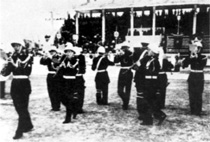
PSP Band (around 1958)
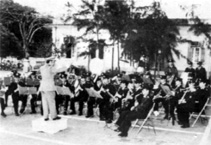
PSP Band and its conductor
J. A. Pinto da Sá
Let us listen to that appeal: Learn History and be consistent. Let the splendour of Portugal rise once more!
TN - ** Sidónio Pais - President of Portugal murdered on 14th December, 1918.
***The new conductor Abel Pinto Teixeira Mendes (1988) and the PSP Band are very successful as well.
* Degree in History (Coimbra University); Researcher of Macau's History and the Portuguese in the East.
start p. 89
end p.